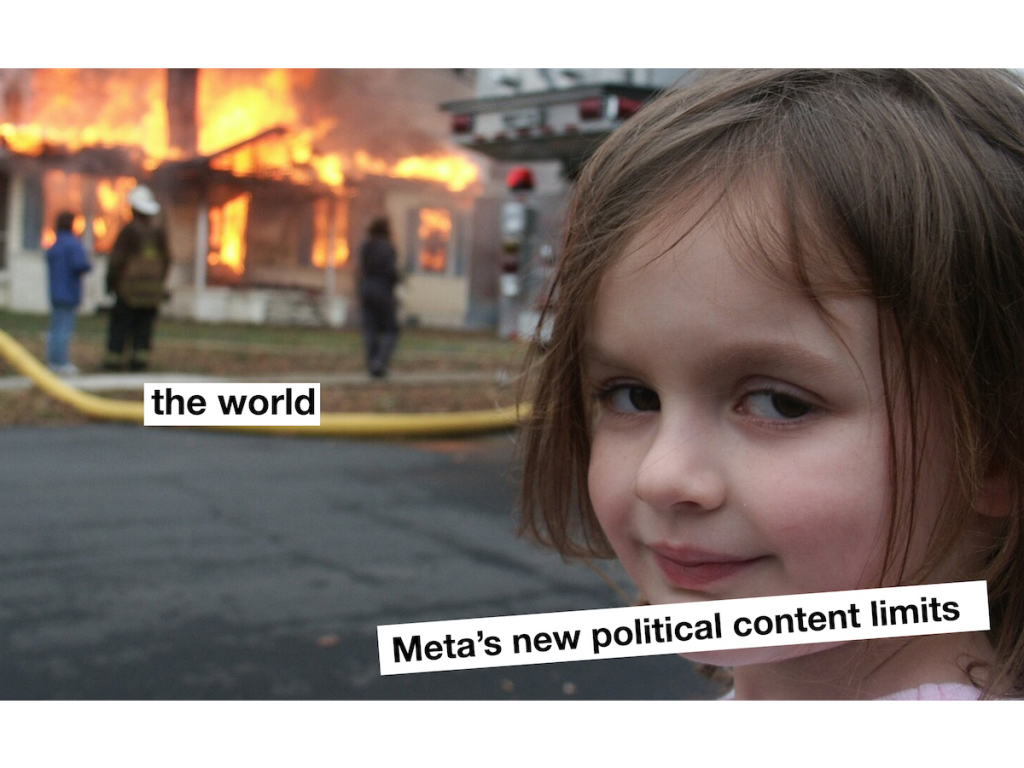
Tech conglomerate Meta quietly rolled out a new auto-limiting feature on Instagram and Threads. “political content” based on user algorithms. The new update is a hidden expansion of the company’s February notice to suspend recommended political content from accounts users were not yet following.
Meta’s feature also follows years of complaints from artists and activists who have suffered content removal and account suspensions or bans after being flagged by Instagram’s content moderation tools. Similar concerns about visibility and artistic freedom surfaced in 2021 after Instagram enabled a default setting that restricted sensitive content, defined as “posts that are not necessarily offensive.” [platform] rules, but it can be disturbing for some people”, without warning. Since 2020, the advocacy group Don’t Delete Art has been raising awareness about aggressive content moderation on Instagram and Facebook and working to defeat bills that would enact such restrictions under the guise of children’s online safety.
Instagram chief Adam Mosseri said the goal is to “preserve people’s ability to choose to interact with political content, respecting each person’s wishes.” But some Instagram users have expressed concern that the new feature is coming ahead of the 2024 presidential election and escalating international political crises, and are sharing infographics on how to remove the default setting.

“I think the need to censor ‘political’ information speaks volumes to the fear that the corporate, neoliberal and capitalist classes have when the masses collectivize, share and build within the networks we create” Shawn. Escarciga, a multidisciplinary artist and community organizer who goes by the name Miss Lady Salad, said her digital collages sarcastically challenge political discourse on social media. Hyperallergic.
Escarciga also questioned Meta’s parameters for political content, leading to critical comments about rent increases, awareness messages for social action, and the use of the watermelon emoji, a symbol of solidarity for the Palestinian liberation struggle, among others.
“It’s scary, but I’m also inspired by the collective impact that sharing a meme, crowdfunding efforts, leveraging real-life actions can have on our broader movements for liberation and justice,” Escarciga said. highlighting how social networks cannot be separated from activism and even everyday life.
“So we take control of the information being shared, we push back against neoliberal and fascist propaganda, and we get political and ‘political’ in spaces that some people might just be using to share pictures of their dinners,” they continued. “And it works.”
Meta has not yet responded Hyperallergicrequest for comment.

Zach Feuer, a New York-based artist with nearly 50,000 Instagram followers, said: Hyperallergic He says he mainly uses his platform for activism, awareness and advocacy and engagement on his account “has dropped significantly since three days ago”. He said he needs to rethink his crowdfunding approach because he would use Instagram to sell artwork from his collection, especially to help Palestinians leave Gaza.
“I depend on live reports from Palestinians for my news these days, and I was really surprised when Facebook briefly suspended the account of Motaz Azaiza, who is one of the most followed and prominent journalists in Palestine today,” Feuer noted. “These social media platforms are not intended to be a tool for any kind of resistance. They are tools to earn capital through capital. But if I can change just one person’s mind, then I’ll keep doing what I’m doing.”
Since the October 7 attack by Hamas and Israel’s ongoing assault on Gaza, cultural institutions have taken away opportunities for art workers to publicly express their pro-Palestinian position on social media. While German institutions have been very vocal about artists’ online activities, the international backlash against pro-Palestinian creatives is spreading, though it has done little to stop them from organizing and speaking out.
Diana Weymar, the textile artist behind the viral and collaborative Tiny Pricks Project materially archiving the impact of the Trump presidency, among other political content, said she “couldn’t do what she does” without Instagram.
“Instagram has opened up a world of opportunities for artists and activists that didn’t exist before,” Weymar said. Hyperallergic, though he stated that after deleting one of his accounts (and subsequently restoring it), he’s now very aware that his profile isn’t really his at the end of the day. The artist also emphasized that Instagram is the cheapest way to share his work: it’s free.
Despite concerns about content moderation and silence, especially in the context of the upcoming election, Weymar said that he may or may not agree with the obvious impact of Meta’s new feature, but that he will continue his Tiny Pricks Project and “hopefully it will reach the people it needs to reach.” ».


